After strange offseason, USC eager to start Pac-12 title quest vs. Arizona State

At 5:45 a.m. on Saturday, seven months after college football shut down because of the novel coronavirus, three months since the Pac-12 season was postponed, and six weeks since its late return became a reality, the longest, strangest offseason in USC football history will finally, mercifully, come to a close … with an early-morning wake-up call.
Nothing is bound to be normal during this shortened, seven-game season, from the eerily empty stadiums to the cardboard crowd and its piped-in cheers to the pregame meals, individually wrapped and delivered to players’ hotel rooms. For USC and Arizona State, the Pac-12 teams at the center of the conference’s late-season, early-morning debut Saturday, the 9 a.m. kickoff could be the least jarring part of the proceedings.
There will be no Trojan Walk, no tailgating, no Traveler galloping the sidelines. The Trojan Marching Band won’t play on, the only stadium noise coming from the crack of pads and the conference-approved crowd audio, which is not allowed to exceed a specific decibel level.
“I don’t think any of us have played in an empty stadium in our lives,” wideout Amon-ra St. Brown said. “That’ll be different.”
But in a cavernous Coliseum, there will be football. It’s the one facet of Saturday that feels familiar. Even if neither USC nor Arizona State knows exactly what to expect from the other.
It’s been almost 11 months since either played a college football game, and both have made radical changes over that time. USC rebuilt its entire defensive staff, instituted a new, hyper-aggressive scheme under former Texas coordinator Todd Orlando, and tried to rebrand its once-timid defense as a bastion of physicality. Arizona State underwent even more significant construction, retooling its offense and defense with three new coordinators, among them longtime Cincinnati Bengals coach Marvin Lewis.
It’s no secret both South Division foes will lean on their stellar sophomore quarterbacks, with USC’s Kedon Slovis and Arizona State’s Jayden Daniels certain to pace the conference from their places under center. Beyond that, their approach is anyone’s guess.
Slovis came alive against the Sun Devils a season ago, throwing four touchdowns in the first quarter, while Daniels sat with an injury, and he’s sure to come out firing this time around, too. But that 31-26 Trojans victory in Tempe was also marked by a near-collapse from USC’s defense, and Orlando expects new Arizona State coordinator Zak Hill will do all he can to confuse the Trojans with pre-snap motion and shifts, in hopes of recreating that chaos.
“We anticipate early in the game that [they will] try to get us moving around and not having our feet set in the ground,” Orlando said. “And Jayden, he can extend plays. He can make all the throws.”

What he won’t do is match the returning firepower at Slovis’ disposal. Where USC lost just three starters on offense, Arizona State has a tall task ahead in replacing Eno Benjamin and Brandon Aiyuk, their two top offensive playmakers from a season ago. USC reshuffled its offensive line in front of Slovis, but the weapons around him are still very much intact, with St. Brown, Tyler Vaughns, and Drake London comprising the West Coast’s most electric receiving corps.
USC has studied plenty of Daniels’ film this week. But with only a limited idea of what the rest of the Sun Devils offense — and defense, for that matter — might look like, coaches haven’t spent as much time on scheme specifics. Instead, coach Clay Helton said, “It’s about us.”
“It's about us executing our systems,” Helton said. “It's about us playing with relentless effort, and it's about us not making the critical errors that we've seen in early ball games that cost teams wins with penalties and unforced turnovers.”
Even a single mistake during this short season could be harmful to the Pac-12’s hopes of a place in the College Football Playoff. An unblemished conference champion could make a case for a spot, but as the Pac-12 tries to squeeze seven games into seven weeks, even that’s hardly guaranteed.
Before the slate even opened this weekend, COVID-19 already claimed two of the conference’s six games, with Utah and Arizona the latest to declare a no-contest on Friday. It was a reminder that the specter of the virus is sure to loom from now through Dec. 19, when a Pac-12 champion is scheduled to be crowned.
With the rest of the conference rebuilding, USC should contend for that title, assuming it first defeats Arizona State.
But unlike in past seasons, it takes just one slip-up — on or off-the-field — for the rug to be pulled out from under a Pac-12 contender.
“If you want to win a championship, you're gonna have to look at perfection,” Helton said. “If you get caught up looking at what's three, four, five, six, seven weeks down the road and not focus on what's right in front of you, you can look up and get your butt beat. And in this format, we're not gonna be able to do that.”
This story originally appeared in Los Angeles Times.

